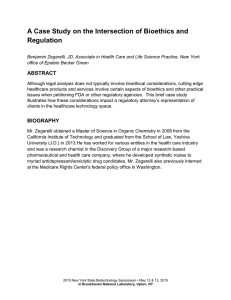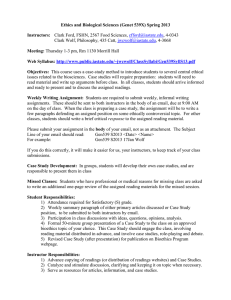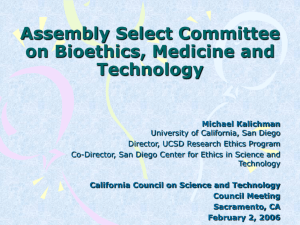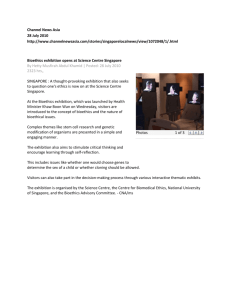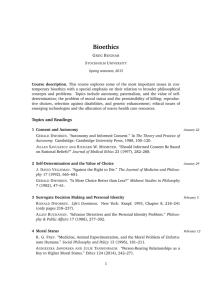The Boston College Center for Christian-Jewish Learning
advertisement
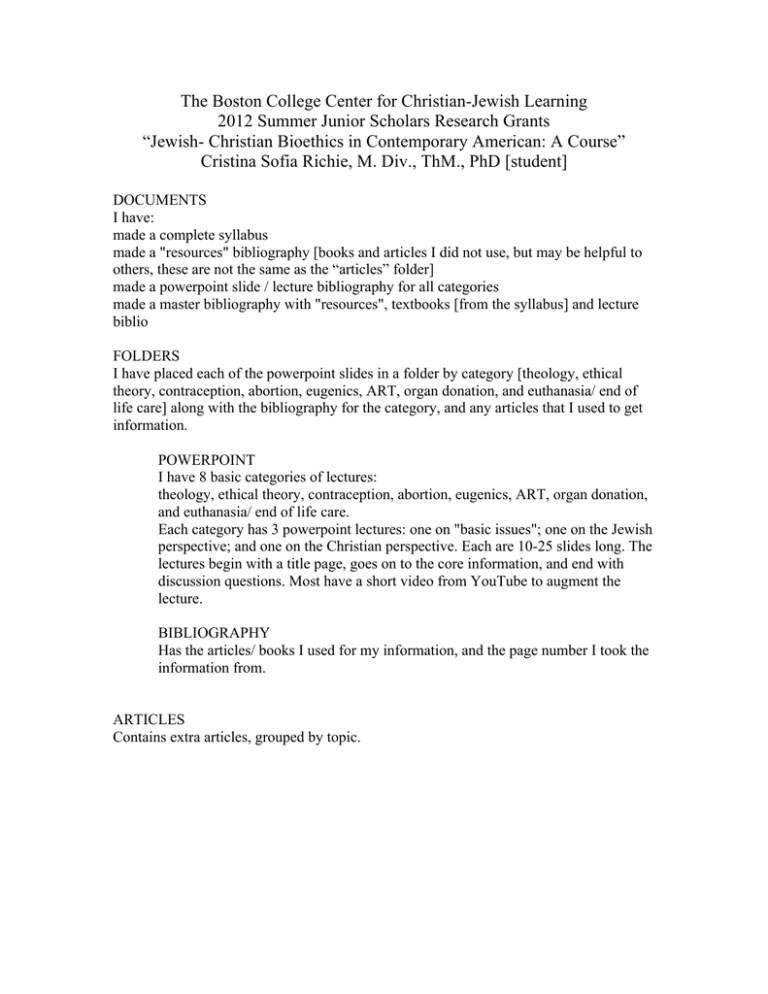
The Boston College Center for Christian-Jewish Learning 2012 Summer Junior Scholars Research Grants “Jewish- Christian Bioethics in Contemporary American: A Course” Cristina Sofia Richie, M. Div., ThM., PhD [student] DOCUMENTS I have: made a complete syllabus made a "resources" bibliography [books and articles I did not use, but may be helpful to others, these are not the same as the “articles” folder] made a powerpoint slide / lecture bibliography for all categories made a master bibliography with "resources", textbooks [from the syllabus] and lecture biblio FOLDERS I have placed each of the powerpoint slides in a folder by category [theology, ethical theory, contraception, abortion, eugenics, ART, organ donation, and euthanasia/ end of life care] along with the bibliography for the category, and any articles that I used to get information. POWERPOINT I have 8 basic categories of lectures: theology, ethical theory, contraception, abortion, eugenics, ART, organ donation, and euthanasia/ end of life care. Each category has 3 powerpoint lectures: one on "basic issues"; one on the Jewish perspective; and one on the Christian perspective. Each are 10-25 slides long. The lectures begin with a title page, goes on to the core information, and end with discussion questions. Most have a short video from YouTube to augment the lecture. BIBLIOGRAPHY Has the articles/ books I used for my information, and the page number I took the information from. ARTICLES Contains extra articles, grouped by topic. Jewish- Christian Bioethics in Contemporary American Syllabus Instructor Professor Email: Phone: Class Meeting/ Location: Credits: Course Description: Recent Jewish – Christian ecumenical endeavors of collaboration have by and large sought to establish theologically consonant ground in order to facilitate peaceful dialogue and a fruitful alliance. In inter-religious dialogue, bioethics has been in the background as national and international political policies and reconciliation from the atrocities of World War II take the foreground. There has been some attention to medical care within the hospital for ecumenical chaplains, but beyond this, Jewish/ Christian collaboration in bioethics has been mostly limited to the last decade. Therefore this class will explore current biomedical issues in America from both Jewish and Christian perspectives. Goals for the Course: The main goals of the course include furthering inter-religious dialogue and bioethical understanding through examining bioethics from a monotheistic religious perspective. This class, by articulating the differences and similarities in Jewish – Christian perspectives on bioethics will allow both the religious individual to determine which approach is best, and the secular person to identify possible latent prejudices against religious perspectives. Course Texts: Lisa Sowle Cahill, Theological Bioethics: Participation, Justice and Change. (Washington, DC: Georgetown University Press, 2005. Refoel Guggenheim, Leonardo Leupin, Yves Nordmann and Raphael Patcas, The Value of Human Life: Contemporary Perspectives in Jewish Medical Ethics. Jerusalem: Feldheim, 2010. Aaron L. Mackler, Introduction to Jewish and Catholic Bioethics: A Comparative Analysis (Moral Traditions series). Washington, DC: Georgetown University Press, 2003. Gilbert Meilaender, Bioethics: A Primer for Christians 2nd ed. Grand Rapids: Eerdmans, 2005. Nisson Shulman, Jewish Answers to Medical Ethics Question. Jerusalem: Jason Aronson, Inc, 1998. *Students will also need to read chapter associated with weekly readings. Students are expected to complete all the reading before class. Grading: Papers [3] 30% Paper presentation [3] 30% Debates [3] 30% Advanced directive 10% Students are expected to come to every class, participate in discussions, and be prepared with the readings done ahead of time. This will be factored into the final grade. - Cheating on papers, consists of knowingly giving, receiving, using, or attempting to give, receive, or use, unauthorized assistance. Students will fail the assignment, and not be given a chance to make up work if found cheating. -Plagiarism is a form of cheating. It occurs when a student fails to credit the original author for ideas and/or statements and puts the words or ideas directly into his/her own writing or speech. It can be avoided by correctly and appropriately citing the source material. Students who plagiarize will fail the assignment, and may or may not be given an opportunity to redo the assignment. Late Work: Work must be handed in at the beginning of class. If you are going to be absent that day, it should also be emailed by class time. You have a 15-minute grace period, at the beginning of class and then it is considered “late”. Once work is late you have one week to turn it in, with a full letter grade drop [a B- paper will get marked C-]. Assignment Descriptions: Papers: Students will choose a topic within the week’s discussion topics and write a 4-5 page research paper in a format of their choosing. For instance, if the topic of the week is “organ donation” the student may choose to write about animal transplantation, or payment for organs, or donation from hydrocephalic infants, etc. Paper presentation: On the day that the 4-5 page research papers are due, they will also be presented to the class. Students may read directly from their paper, or summarize their findings. This should take no more than 10-15 minutes. Debates: Students will have a chance to debate the multifaceted issues within bioethics during class time. Students will be assigned “pro” or “con” by the instructor, and have class time to prepare their arguments as a group, and time outside of class to prepare individual information. Debates are graded on participation. Advance directive: Students will create a personal advanced directive, 1-2 pages doublespaced. This AD will detail where, how, and when you would like to die, should you become terminally ill. Include what you want done with your organs and tissues. Think about what constitutes quality of life for you. Is euthanasia acceptable? Who will make your decisions if you cannot speak? *Cell phones and other electronics are strictly prohibited in class, unless there is a medical emergency. Use will result in a grade drop. Computers may be used to take notes, but being online is forbidden, and will result in loss of computer privileges. Schedule of Classes Week 1 Theology and Beliefs Class 1: Jewish Theology Class 2: Christian Theology Class Work: ethics games Homework: none Reading: Meilaender, ch. 1, Guggenheim, ch. 2 “The Infinite Value”, Shulman, pgs.1-6 Week 2 Why ethics? Ethical methodology and philosophy Class 3: Ethical Theory [Basic Issues] Class 4: Jewish Ethical Theory Class Work: case studies Homework: all prepare for debate Reading: Mackler, chs. 1-2, Guggenheim ch. 1 “Jewish Medical Ethics” Week 3 Ethical Theory/ Contraception Class 5: Christian Ethical Theory Class 6: Contraception [Basic Issues] Class Work: debate on contraception Homework: paper group 1 prepare Reading: Cahill, ch. 1-2, Shulman pgs. 41-60 Week 4 Contraception Class 7: Jewish Contraception Class 8: Christian Contraception Class Work: paper presentations 1 Homework: paper group 2 prepare Reading: Meilaender, ch. 2, Guggenheim, ch. 9 “The Beginning of Human Life”, Shulman pgs. 70-74, 77 Week 5 Abortion Class 9: Abortion [Basic Issues] Class 10: Judaism and Abortion Class Work: paper presentations 2 Homework: all prepare for debate Reading: Mackler, ch. 5, Shulman pgs. 74-77 Week 6 Abortion/ Eugenics Class 11: Christianity and Abortion Class 12: Eugenics [Basic Issues] Class Work: debate on abortion Homework: paper group 1 prepare Assignment due: advanced directive outline Reading: Meilaender, ch. 3, Meilaender ch. 10, Shulman pgs. 35-40 Week 7 Eugenics Class 13: Judaism and Eugenics Class 14: Christianity and Eugenics Class Work: paper presentations 1 Homework: paper group 2 prepare Reading: Meilaender, ch. 5 Guggenheim, ch. 10, “Pre-Implanation”, Shulman pgs. 102106 Week 8 Assisted Reproductive Technologies Class 15: Assisted Reproductive Technologies [Basic Issues] Class 16: Judaism and Assisted Reproductive Technologies Class Work: paper presentations 2 Homework: all prepare for debate Reading: Cahill, ch. 6, Guggenheim, ch. 9 “The Beginning of Human Life”, Shulman pgs. 77-84 Week 9 Assisted Reproductive Technologies/ Organ Donation Class 17: Christianity and Assisted Reproductive Technologies Class 18: Organ Donation [Basic Issues] Class Work: debate on paid organ transplants Homework: paper group 1 prepare Reading: Mackler, ch. 6, Meilaender, ch. 9, Shulman pgs. 117-132 Week 10 Organ Donation Class 19: Judaism and Organ Donation Class 20: Christianity and Organ Donation Class Work: paper presentations 1 Homework: paper group 2 prepare Reading: Guggenheim, ch. 5 “The Organ Debate”, Guggenheim ch. 7 “The Brain Death…America”, Shulman pgs. 175-183 Week 11 Euthanasia Class 21: Euthanasia [Basic Issues] Class 22: Judaism and Euthanasia Class Work: paper presentations 2 Homework: write one case study to discuss in class [1/2 page] Reading: Mackler, ch. 3-4, Guggenheim, ch. 3, “The Dying Patient”, Meilaender ch. 6, Shulman pgs. 185-196 Euthanasia/ Wrap Up Class 23: Christianity and Euthanasia Class 24: Wrap up Class Work: case studies Assignment due: Advanced directive Reading: Mackler conclusion, Meilaender, ch. 12, Guggenheim ch. 4 “The Patient at the End of Life” Other Resources Bibliography Barilan, Y. Michael, “Revisiting the Problem of Jewish Bioethics: The Case of Terminal Care,” Kennedy Institute of Ethics Journal, vol. 13, no. 2 (2003) 141-168. Beauchamp, Tom. L., LeRoy Walters, Jeffrey P. Kahn, and Anna C. Mastroianni, eds. Contemporary Issues in Bioethics, Belmont, CA: Wadsworth, 2007. Broyde, Michael J. “Pre-Implantation Genetic Diagnosis, Stem Cells, and Jewish Law” Tradition 38 no. 1: 54-75. Central Conference of American Rabbis. A Reform Jewish Group. Cohen, Eric. “A Jewish-Catholic Bioethics?,” First Things, vol. 154, no. 4 (2005) 7-10. Cole-Turner, Ronald, ed., Design and Destiny: Jewish and Christian Perspectives on Human Germline Modification, Cambridge, MA: MIT Press, 2008. Eberl, Jason T., “The Complex Nature of Jewish and Catholic Bioethics,” The American Journal of Bioethics, vol. 9, no. 11 (2009) 31-32. Halakha Organ Donor Society [HODS] Iozzio, Mary Jo, ed., Considering Religious Traditions in Bioethics: Christian and Jewish Voices, Scranton, PA: University of Scranton Press, 2005. Levin, Mark, and Ira Birnbaum. “Jewish Bioethics? (Morality, Religion and Metaphysics: Diverse Visions in Bioethics),” The Journal of Medicine and Philosophy, vol. 25, no. 4 (2000) 469-484. Mackler, Aaron L. “Jewish and Roman Catholic Approaches to Access to Health Care and Rationing,” Kennedy Institute of Ethics Journal, vol. 11, no. 4 (2001) 317336. Metropolitan Chicago Healthcare Council, “Guidelines for Health Care Providers Interacting with Patients and Families of Different Religious Traditions,” 04 Mar 2008. Pellegrino, Edmund D. and Alan I. Faden, eds., Jewish and Catholic Bioethics: An Ecumenical Dialogue, Washington, DC: Georgetown University Press, 2000. Popovsky, Mark. “Coping with Multiple Uncertainties: A Jewish Perspective on Genetic Testing for Breast Cancer and Prophylactic Interventions” Journal of the Society of Christian Ethics, 29,1 (2009): 127-115. Rae, Scott B. and Paul M. Cox. Bioethics: A Christian Approach in a Pluralistic Age, Grand Rapids: WB Eerdmans, 1999. Rasmussen, Lisa M. “Morality, Religion and Metaphysics: Diverse Visions in Bioethics” Journal of Medicine and Philosophy 25 no. 4 (2000, ): 367–377. Schonfel, Toby L. “Messages from the Margins: Lessons from Feminist Bioethics” Journal of the Society of Christian Ethics, 28,1 (2008): 209-224. Sinclair, Daniel B., “Assisted Reproduction in Jewish law,” Fordham Urban Law Journal, vol. 30, no. 1 (2002) 71-106. Shulman, Nisson. Jewish Answers to Medical Ethics Question. Jerusalem: Jason Aronson, Inc, 1998. Tollefsen, Christopher. “Mind the Gap: Charting the Distance between Christian and Secular Bioethics,” Christian Bioethics, vol. 17, no. 1 (2011) 47-53. www.Jlaw.com An Orthodox Jewish website. www.rabbinicalassembly.org A Conservative Jewish website. Power Point Bibliography American College of Obstetricians and Gynecologists (ACOG). NEWS RELEASE New Gallup Survey Reveals Disturbing Trends, “Bad Economy Blamed for Women Delaying Pregnancy and Annual Check-Up” May 5, 2009. Bledin, K. D., J. E. Cooper, S. Mackenzie, and B. Brice. ”Contraceptive Attitudes and Practice in Women Choosing Sterilization” Journal of the Royal College of General Practitioners (1984): 595-599. Brander, Kenneth. “Sex Selection and Halakhic Ethics: A Conversation” Tradition 40 no. 1 (2007): 53-56. Cohn-Sherbok, Dan. “Judaism and Euthanasia” Judaism and Euthanasia 27- 33. Congregation for the Doctrine of the Faith, The Dignity of a Person: Dignitas personae (Washington, DC: United States Conference of Catholic Bishops, 2009. ______. Instruction on Respect for Human Life in Its Origin and on the Dignity of Procreation: Replies to Certain Questions of the Day: Donum vitae. Washington, DC: United States Catholic Conference, 1987. Demmer, Klaus. “Ethical Aspects of Reproductive Medicine.” In Andrology: Male Reproductive Health and Dysfunction, 2nd ed., edited by E. Nieschlag and H. van Ahlen, Berlin: Springer, 2001, 433-440. Dorff, Elliot N. “Is There a Unique Jewish Ethics? The Role of Law in Jewish Bioethics” Annual of the Society of Christian Ethics, 21 (2001): 305-317. Erickson, Millard J. and Ines E. Bowers, “Euthanasia and Christian Ethics” Journal of the Evangelical Theological Society (1976): 15-24. Florida Catholic Conference, “The Donation of Organs: A Celebration of the Gospel of Life,” 14 no. 4 (1995) at http://www.flaccb.org/Commentaries/Comm1295.htm Food and Drug Administration, “How much does birth control cost” US News, 27 August 2010 at http://money.usnews.com/money/blogs/alphaconsumer/2010/08/27/how-much-does-birth-control-cost Friedman, Michelle. “Sex Selection and Halakhic Ethics: A Conversation” Tradition 40 no. 1 (2007): 60-62. Freundel, Barry. “Sex Selection and Halakhic Ethics: A Conversation” Tradition 40 no. 1 (2007): 57-60. Greenburger, Ben. “Sex Selection and Halakhic Ethics: A Conversation” Tradition 40 no. 1 (2007): 65-68. Haas, John. “The Inseparability of the Two Meanings of the Marriage Act,” in Reproductive Technologies, Marriage and the Church, ed. Donald G. McCarthy (Braintree, MA: The Pope John XXIII Center, 1998. Hall, Amy Laura. “Good Breeding: The Eugenics Temptation,” Christian Century (November 2, 2004), 24-29. Hauerwas, Stanley. Suffering Presence: Theological Reflections on Medicine, the Mentally Handicapped, and the Church (Notre Dame: University of Notre Dame Press, 1986. Hui, Edwin C. At the Beginning of Life: Dilemmas in Theological Bioethics. Dower’s Grove, Ill.: InterVarsity Press, 2002. Hursthouse, Rosalind. “Virtue Theory and Abortion,” in Virtue Ethics (Washington DC: George University Press, 1997). Ed. Daniel Statman. 227-244. Jung, Patricia Beattie. “Abortion and Organ Donation: Christian Reflections on Bodily Life Support” The Journal of Religious Ethics 273-305. Kaplan, Feige. “Sex Selection and Halakhic Ethics: A Conversation” Tradition 40 no. 1 (2007): 69-72. Mackler, Aaron L. “Is There a Unique Jewish Bioethics of Human Reproduction? Annual of the Society of Christian Ethics, 21 (2001): 319-323. McKenny, Gerald P. To Relieve the Human Condition: Bioethics, Technology, and the Body (Albany: State University of New York Press, 1997. Modras, Ronald. “Birth Control, Personalism, and the Pope” 283-290: 283-284. Ofri, Danielle. “Giving Something To Gain Something.” The New York Times 21 Feb. 2012 at http://query.nytimes.com/gst/fullpage.html?res=9806EFD6153FF932A15751C0A 9649D8B63&pagewanted=all Palmer, Kimberly. “The Real Cost of Birth Control”, Alpha Consumer Posted: August 27, 2010. Planned Parenthood. “Birth Control Matters: Making Prescription Birth Control Affordable for America’s Women” at http://www.plannedparenthood.org/ppgnw/birth-control-matters-32835.htm __________. “Planned Parenthood by the Numbers”. http://www.plannedparenthood.org/about-us/newsroom/politics-policyissues/fact-sheets-reports-32754.htm Pope Paul VI. Sacred Congregation for the Doctrine of the Faith, Declaration on Procured Abortion, June 28, 1974/ November 18, 1974. Rice, S. “HHS Oks Birth Control with No Co-pay” CNN News 01 August 2011. Richie, Cristina. “Comparative Religion- Abrahamic Faiths”, RL 200. Taught at Marian Court College, Spring 2012. ________. “Contemporary Approaches to Bioethics”, EXP 0027. Taught at Tufts University Spring 2012. _________. “Population Growth, Birth Control, and Income,” Population Press 17 no. 3 (2011): 14-15. Reichman, Edward. “Sex Selection and Halakhic Ethics: A Conversation” Tradition 40 no. 1 (2007): 73-76. Roberts, D. Killing the Black Body: Race, Reproduction, and the Meaning of Liberty in Genetics: Science , Ethics, and Public Policy, ed. Thomas A. Shannon (Lanahm: Rowman & Littlefield Publishers, Inc., 2005) 251-252. Sanger, Margaret. “Too Many People.” Together (September 1957): 16- 17. Spitz, Elie Kaplan. “Sweet GIFTS A Jewish Response to Gilbert Meilaender” Journal of Religious Ethics 29 vol.1 (2001): 19-23. Tiong, Danilo C. “Human Organ Transplants,” in Beyond a Western Bioethics: Voices from the Developing World, Angeles Tan Alora and Josephine M. Lumitao, eds. (Washington DC: Georgetown University Press, 2001) 89-93. United States Conference of Catholic Bishops. Ethical and Religious Directives for Catholic Health Care Services, Fifth Edition. Washington, DC: United States Catholic Conference, 2009 . Wagner, William. “Public Policy Recommendations,” in Reproductive Technologies, Marriage and the Church, ed. Donald G. McCarthy (Braintree, MA: The Pope John XXIII Center, 1998) 267-308. Warburg, Ronnie. “Renal Transplantation: Living Donors and Markets for Body PartsHalakha in Concert with Halakhic Policy or Public Policy.” Tradition 40 no. 2 (2007): 14-48. Wolowelsky, Joel B. and Richard V. Grazi. “Sex Selection and Halakhic Ethics: A Conversation” Tradition 40 no. 1 (2007): 45-53. World InVitro Fertilization Units, “Masturbation,” at http://www.ivfworldwide.com/Education/sperm-collection.html accessed January 15, 2012. Zimmerman, Deena. “Sex Selection and Halakhic Ethics: A Conversation” Tradition 40 no. 1 (2007): 76-78. Zoloth, Laurie. “Nursing Fathers and Nursing Mothers: Notes toward a Distinctive Jewish View of Reproductive Ethics Annual of the Society of Christian Ethics, 21 (2001): 325-337. Master Bibliography American College of Obstetricians and Gynecologists (ACOG). NEWS RELEASE New Gallup Survey Reveals Disturbing Trends, “Bad Economy Blamed for Women Delaying Pregnancy and Annual Check-Up” May 5, 2009. Barilan, Y. Michael. “Revisiting the Problem of Jewish Bioethics: The Case of Terminal Care,” Kennedy Institute of Ethics Journal, vol. 13, no. 2 (2003) 141-168. Beauchamp, Tom. L., LeRoy Walters, Jeffrey P. Kahn, and Anna C. Mastroianni, eds. Contemporary Issues in Bioethics, Belmont, CA: Wadsworth, 2007. Bledin, K. D. J. E. Cooper, S. Mackenzie, and B. Brice, ”Contraceptive Attitudes and Practice in Women Choosing Sterilization” Journal of the Royal College of General Practitioners (1984): 595-599. Brander, Kenneth. “Sex Selection and Halakhic Ethics: A Conversation” Tradition 40 no. 1 (2007): 53-56. Broyde, Michael J. “Pre-Implantation Genetic Diagnosis, Stem Cells, and Jewish Law” Tradition 38 no. 1: 54-75. Cahill, Lisa Sowle. Theological Bioethics: Participation, Justice and Change. (Washington, DC: Georgetown University Press, 2005. Central Conference of American Rabbis. A Reform Jewish Group. Cohen, Eric. “A Jewish-Catholic Bioethics?,” First Things, vol. 154, no. 4 (2005) 7-10. Cohn-Sherbok, Dan. “Judaism and Euthanasia” Judaism and Euthanasia 27- 33. Cole-Turner, Ronald, ed., Design and Destiny: Jewish and Christian Perspectives on Human Germline Modification, Cambridge, MA: MIT Press, 2008. Congregation for the Doctrine of the Faith. The Dignity of a Person: Dignitas personae (Washington, DC: United States Conference of Catholic Bishops, 2009. ______. Instruction on Respect for Human Life in Its Origin and on the Dignity of Procreation: Replies to Certain Questions of the Day: Donum vitae. Washington, DC: United States Catholic Conference, 1987. Demmer, Klaus. “Ethical Aspects of Reproductive Medicine.” In Andrology: Male Reproductive Health and Dysfunction, 2nd ed., edited by E. Nieschlag and H. van Ahlen, Berlin: Springer, 2001, 433-440. Dorff, Elliot N. “Is There a Unique Jewish Ethics? The Role of Law in Jewish Bioethics” Annual of the Society of Christian Ethics, 21 (2001): 305-317. Eberl, Jason T. “The Complex Nature of Jewish and Catholic Bioethics,” The American Journal of Bioethics, vol. 9, no. 11 (2009) 31-32. Erickson, Millard J. and Ines E. Bowers. “Euthanasia and Christian Ethics” Journal of the Evangelical Theological Society (1976): 15-24. Florida Catholic Conference. “The Donation of Organs: A Celebration of the Gospel of Life,” 14 no. 4 (1995) at http://www.flaccb.org/Commentaries/Comm1295.htm Food and Drug Administration, “How much does birth control cost” US News, 27 August 2010 at http://money.usnews.com/money/blogs/alphaconsumer/2010/08/27/how-much-does-birth-control-cost Friedman, Michelle. “Sex Selection and Halakhic Ethics: A Conversation” Tradition 40 no. 1 (2007): 60-62. Freundel, Barry. “Sex Selection and Halakhic Ethics: A Conversation” Tradition 40 no. 1 (2007): 57-60. Greenburger, Ben. “Sex Selection and Halakhic Ethics: A Conversation” Tradition 40 no. 1 (2007): 65-68. Guggenheim, Refoel, Leonardo Leupin, Yves Nordmann and Raphael Patcas. The Value of Human Life: Contemporary Perspectives in Jewish Medical Ethics. Jerusalem: Feldheim, 2010. Haas, John. “The Inseparability of the Two Meanings of the Marriage Act,” in Reproductive Technologies, Marriage and the Church, ed. Donald G. McCarthy (Braintree, MA: The Pope John XXIII Center, 1998. Halakha Organ Donor Society [HODS] Hall, Amy Laura. “Good Breeding: The Eugenics Temptation,” Christian Century (November 2, 2004), 24-29. Hauerwas, Stanley. Suffering Presence: Theological Reflections on Medicine, the Mentally Handicapped, and the Church (Notre Dame: University of Notre Dame Press, 1986. Hui, Edwin C. At the Beginning of Life: Dilemmas in Theological Bioethics. Dower’s Grove, Ill.: InterVarsity Press, 2002. Hursthouse, Rosalind. “Virtue Theory and Abortion,” in Virtue Ethics (Washington DC: George University Press, 1997). Ed. Daniel Statman. 227-244. Iozzio, Mary Jo, ed., Considering Religious Traditions in Bioethics: Christian and Jewish Voices, Scranton, PA: University of Scranton Press, 2005. Jung, Patricia Beattie. “Abortion and Organ Donation: Christian Reflections on Bodily Life Support,” The Journal of Religious Ethics 273-305. Kaplan, Feige. “Sex Selection and Halakhic Ethics: A Conversation,” Tradition 40 no. 1 (2007): 69-72. Levin, Mark, and Ira Birnbaum. “Jewish Bioethics? (Morality, Religion and Metaphysics: Diverse Visions in Bioethics),” The Journal of Medicine and Philosophy, vol. 25, no. 4 (2000) 469-484. Mackler, Aaron L. Introduction to Jewish and Catholic Bioethics: A Comparative Analysis (Moral Traditions series). Washington, DC: Georgetown University Press, 2003. ________. “Jewish and Roman Catholic Approaches to Access to Health Care and Rationing,” Kennedy Institute of Ethics Journal, vol. 11, no. 4 (2001) 317-336 ________. “Is There a Unique Jewish Bioethics of Human Reproduction? Annual of the Society of Christian Ethics, 21 (2001): 319-323. McKenny, Gerald P. To Relieve the Human Condition: Bioethics, Technology, and the Body (Albany: State University of New York Press, 1997. Meilander, Gilbert. Bioethics: A Primer for Christians 2nd ed. Grand Rapids: Eerdmans, 2005. Metropolitan Chicago Healthcare Council, “Guidelines for Health Care Providers Interacting with Patients and Families of Different Religious Traditions,” 04 Mar 2008. Modras, Ronald. “Birth Control, Personalism, and the Pope” 283-290: 283-284. Ofri, Danielle. “Giving Something To Gain Something.” The New York Times 21 Feb. 2012 at http://query.nytimes.com/gst/fullpage.html?res=9806EFD6153FF932A15751C0A 9649D8B63&pagewanted=all Palmer, Kimberly. “The Real Cost of Birth Control”, Alpha Consumer Posted: August 27, 2010. Pellegrino, Edmund D. and Alan I. Faden, eds., Jewish and Catholic Bioethics: An Ecumenical Dialogue, Washington, DC: Georgetown University Press, 2000. Planned Parenthood. “Birth Control Matters: Making Prescription Birth Control Affordable for America’s Women” at http://www.plannedparenthood.org/ppgnw/birth-control-matters-32835.htm ________. “Planned Parenthood by the Numbers”. http://www.plannedparenthood.org/about-us/newsroom/politics-policyissues/fact-sheets-reports-32754.htm Pope Paul VI. Sacred Congregation for the Doctrine of the Faith, Declaration on Procured Abortion, June 28, 1974/ November 18, 1974. Popovsky, Mark. “Coping with Multiple Uncertainties: A Jewish Perspective on Genetic Testing for Breast Cancer and Prophylactic Interventions” Journal of the Society of Christian Ethics, 29,1 (2009): 127-115. Rae, Scott B. and Paul M. Cox. Bioethics: A Christian Approach in a Pluralistic Age, Grand Rapids: WB Eerdmans, 1999. Rasmussen, Lisa M. “Morality, Religion and Metaphysics: Diverse Visions in Bioethics” Journal of Medicine and Philosophy 25 no. 4 (2000, ): 367–377. Rice, S. “HHS Oks Birth Control with No Co-pay” CNN News 01 August 2011. Richie, Cristina. “Comparative Religion- Abrahamic Faiths”, RL 200. Taught at Marian Court College, Spring 2012. ________. “Contemporary Approaches to Bioethics”, EXP 0027. Taught at Tufts University Spring 2012. ________. “Population Growth, Birth Control, and Income,” Population Press 17 no. 3 (2011): 14-15. Reichman, Edward. “Sex Selection and Halakhic Ethics: A Conversation” Tradition 40 no. 1 (2007): 73-76. Roberts, D. Killing the Black Body: Race, Reproduction, and the Meaning of Liberty in Genetics: Science, Ethics, and Public Policy, ed. Thomas A. Shannon (Lanahm: Rowman & Littlefield Publishers, Inc., 2005) 251-252. Sanger, Margaret. “Too Many People.” Together (September 1957): 16- 17. Spitz, Elie Kaplan. “Sweet GIFTS A Jewish Response to Gilbert Meilaender” Journal of Religious Ethics 29 vol.1 (2001): 19-23. Schonfel, Toby L. “Messages from the Margins: Lessons from Feminist Bioethics” Journal of the Society of Christian Ethics, 28,1 (2008): 209-224. Sinclair, Daniel B. “Assisted Reproduction in Jewish law,” Fordham Urban Law Journal, vol. 30, no. 1 (2002) 71-106. Shulman, Nisson. Jewish Answers to Medical Ethics Question. Jerusalem: Jason Aronson, Inc, 1998. Tiong, Danilo C. “Human Organ Transplants,” in Beyond a Western Bioethics: Voices from the Developing World, Angeles Tan Alora and Josephine M. Lumitao, eds. (Washington DC: Georgetown University Press, 2001) 89-93. Tollefsen, Christopher. “Mind the Gap: Charting the Distance between Christian and Secular Bioethics,” Christian Bioethics, vol. 17, no. 1 (2011) 47-53. United States Conference of Catholic Bishops. Ethical and Religious Directives for Catholic Health Care Services, Fifth Edition. Washington, DC: United States Catholic Conference, 2009 . Wagner, William. “Public Policy Recommendations,” in Reproductive Technologies, Marriage and the Church, ed. Donald G. McCarthy (Braintree, MA: The Pope John XXIII Center, 1998) 267-308. Warburg, Ronnie. “Renal Transplantation: Living Donors and Markets for Body PartsHalakha in Concert with Halakhic Policy or Public Policy.” Tradition 40 no. 2 (2007): 14-48. Wolowelsky, Joel B. and Richard V. Grazi, “Sex Selection and Halakhic Ethics: A Conversation” Tradition 40 no. 1 (2007): 45-53. World InVitro Fertilization Units, “Masturbation,” at http://www.ivfworldwide.com/Education/sperm-collection.html accessed January 15, 2012. www.Jlaw.com An Orthodox Jewish website. www.rabbinicalassembly.org A Conservative Jewish website. Zimmerman, Deena. “Sex Selection and Halakhic Ethics: A Conversation” Tradition 40 no. 1 (2007): 76-78. Zoloth, Laurie. “Nursing Fathers and Nursing Mothers: Notes toward a Distinctive Jewish View of Reproductive Ethics Annual of the Society of Christian Ethics, 21 (2001): 325-337.

